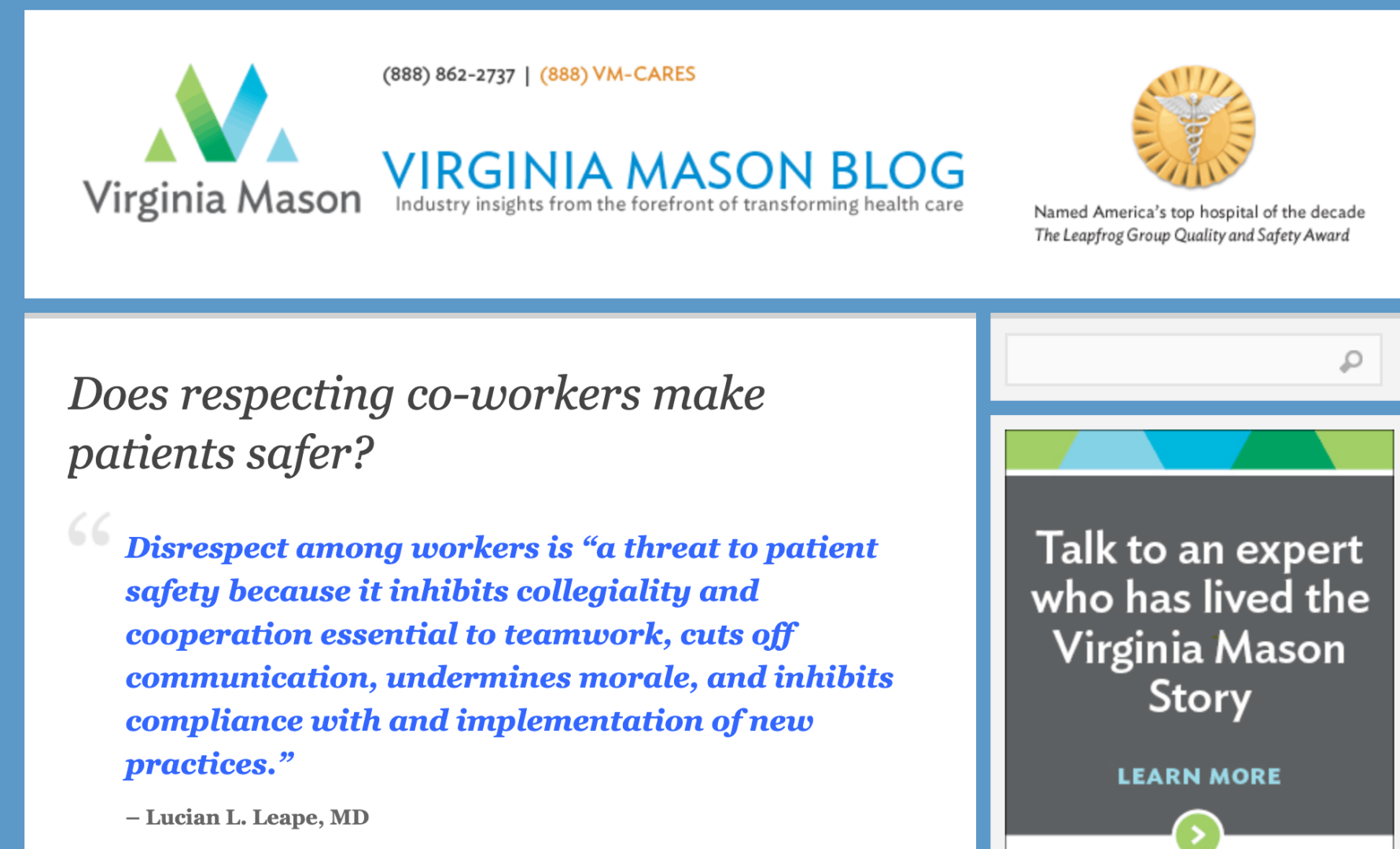There's an excellent blog post on the Virginia Mason Medical Center site: “Does respecting co-workers make patients safer?“

As a leader in adopting and adapting Toyota management methods to healthcare, Virginia Mason understands that “respect for people” is a core part of this philosophy (as I've recently blogged about). Respectful behavior is an active choice we make each and every day. Disrespectful attitudes and behavior can interfere with providing the best patient care.
They quote patient safety expert Dr. Lucian Leape:
“A substantial barrier to progress in patient safety is a dysfunctional culture rooted in widespread disrespect [including] … disruptive behavior; humiliating, demeaning treatment of nurses, residents, and students; passive-aggressive behavior; passive disrespect; dismissive treatment of patients; and systemic disrespect.”
They quote Leape as saying that these behaviors are a threat to patient safety and VMMC is working to replace these negative behaviors with positive, respectful behaviors. Their blog post describes a theatrical production was created to illustrate ten key behaviors, including:
- Listen to understand
- Share information
- Walk in their shoes
A key question in all of this is whether or not an organization can really influence the behavior of their employees and medical staff. From my experience, it helps to have senior leaders modeling behaviors they want to see through the rest of the organization. When the CEO stops “naming, blaming, and shaming” in response to errors or problems, leaders at lower levels see that it's OK to react that way themselves. But, can everybody change? Can enough people change?
See this related article from FierceHealthcare: Hospitals have had it with misbehaving docs.
One of the reasons hospitals are losing their tolerance for this behavior is guidance issued by The Joint Commission, warning hospitals that intimidating and disruptive behaviors can foster medical errors, contribute to poor patient satisfaction and adverse outcomes, increase the cost of care, and force medical personal to seek new positions.
“To assure quality and to promote a culture of safety, health care organizations must address the problem of behaviors that threaten the performance of the health care team,” The Join Commission wrote in the guidance.
An example:
Physician executive and Hospital Impact blogger Jonathan Burroughs, M.D., recounted an episode early in his career that illustrates the kinds of concerns communicated by The Joint Commission. After berating a nurse for not knowing what epinephrine and atropine were, Burroughs, upon reflection, concluded that his medical training had failed him in this situation, according to a Hospital Impact blog post. “Treating people with disrespect and shame will not improve human performance nor will it help patients to have better outcomes,” he wrote.
I hope hospitals have also had it with misbehaving executives and managers, as well! Disrespectful behavior from leaders is corrosive to an organization and a team environment… and this certainly impacts quality, safety, and other important factors in healthcare organizations (and any type of organization).
Please scroll down (or click) to post a comment. Connect with me on LinkedIn.
Let’s work together to build a culture of continuous improvement and psychological safety. If you're a leader looking to create lasting change—not just projects—I help organizations:
- Engage people at all levels in sustainable improvement
- Shift from fear of mistakes to learning from them
- Apply Lean thinking in practical, people-centered ways
Interested in coaching or a keynote talk? Let’s start a conversation.





![What’s Your Organization’s Real Mistake Policy? [Poll]](https://www.leanblog.org/wp-content/uploads/2025/07/Lean-Blog-Post-Cover-Image-2025-07-17T085114.134-238x178.jpg)


![What’s Your Organization’s Real Mistake Policy? [Poll]](https://www.leanblog.org/wp-content/uploads/2025/07/Lean-Blog-Post-Cover-Image-2025-07-17T085114.134-100x75.jpg)

Thanks for passing this info along Mark! Definitely needed, looking forward to the 2nd part.
Interesting that one of the comments about Fiercehealthcare link of hospitals not tolerating misbehavior opted to try to shift the focus to ‘mandated’ use of EMR. Blame the tool.
Mandated use of anything or any process is, in some circumstances, a different form of bullying.
Agree- one problem I have really noticed is that staff never listen to each other or the patients !
This issue can be looked at from different perspectives:
1. In the lean model of management in health care, continuous improvement and respect for people lead to ‘Perfection’. Respect for people may mean autonomy for each single professional role in healthcare or avoiding wrong culture of accusation and punishment. The ‘bad apple’ approach has been shown to be inefficient. It ends up with defensive medicine or hiding errors that per se has increased the healthcare costs and reduced quality of health care.
2. Respect for people has also been emphasized in other models such as those in ‘High Reliability Organizations’. Individuals are not blamed but rather provided with reminders and tools to reduce errors and enjoy positive effects of enhanced resilience to system.
Hopefully, more emphasis has recently been enforced on these issues by health politicians.
Siamak – I think the “health politicians” have zero visibility into or zero interest in these issues, unfortunately.
I find that lean and Japanese manufacturing concepts tend to focus more on the satisfaction of the customer rather than the worker. To me, it makes little sense to argue about whether happy workers will lead to higher quality medical care. Ensuring that all parties and stakeholders are being respected is critical for success, particularly in a setting where coordination and trust are crucial. The “naming, shaming, blaming” cycle likely occurs as frequently as PDSA. But how does that add value to the company or the patient? It likely adds no value at all. Rather, appreciating and acknowledging each team member and worker will likely establish confidence and respect throughout the organization.
Kaori – when you say “I find that” Lean focuses more on the customer than the worker… what is your experience or evidence of that?
They go hand in hand… Lean/TPS is, of course, customer focused but I’ve never seen a management philosophy that is more focused on meeting the needs of workers and treating them with respect.
One of the most important points of this post is the realization that ‘A key question in all of this is whether or not an organization can really influence the behavior of their employees and medical staff.’ Respect for people between employees is undoubtedly important and has a huge impact on communication between providers, which can then impact patient interactions and treatment.
It’s essential to realize that encouraging respectful behavior implies behavior change, which can be difficult and lengthly. How can stimulate behavior change among senior leaders?
Thank you for the article, the lean concept is new to me as I’m studying it as part of my Practice Management degree. Your blog had been an important asset in my learning journey.
You’re welcome, Cida. Good luck to you in your continued learning, practice, and work…